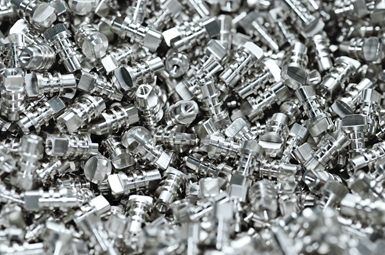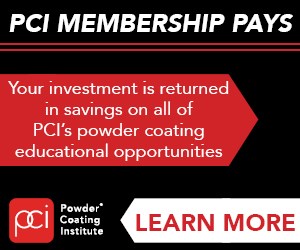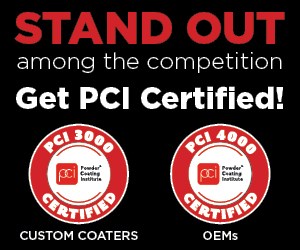Waking Up to a World Without Manufacturing
Virtually everything humanity holds or uses owes its existence to our sector.

The pandemic has been so hard on so many. Lives lost and life plans, classrooms and places of business completely upended, an unprecedented mental health crisis, a global supply chain in chaos, and the list goes on. As devastating as the last two-plus years have been, however, the period has not been without its silver linings.
One of them is that the rest of the world now knows what those of us in the world of surface finishing have known all along: the incredible importance of U.S. manufacturing to the overall economy. When consumers can get what they want, when they want it and at a price that seems reasonable, it’s quite easy for them to take manufacturing for granted. When their ability to do so is restrained by a dysfunctional supply chain, suddenly they begin to realize the incredible difference that manufacturing, finishing and a well-oiled supply chain once made in their lives.
Imagine waking one morning to an economy without U.S. manufacturing. $2.4 trillion in annual gross domestic product vanished without a trace, and along with it the more than 12 million careers in the manufacturing sector. Twelve million careers that, by recent numbers, paid more than $83,000 per year on average – more than 57% higher than the annual compensation provided by the average non-farm business job.
But the impact of U.S. manufacturing doesn’t begin and end with the economic impact on business owners and their employees. Manufacturing companies are not just producers, but consumers. They insure their businesses and their employees, helping fuel an entire property, casualty, health and workers’ compensation industry. Individual manufacturers purchase manufacturing equipment and subcontract manufacturing services, supporting even more manufacturing economic impact. Manufacturers purchase natural gas, electricity, city steam and other forms of energy, contributing to jobs and opportunities in these sectors. Manufacturers procure materials, textiles and plastics, finishers purchase metals, proprietary chemicals and commodity chemicals and both acquire vehicles, trucks and forklifts to transport them.
Manufacturers engage attorneys, accountants and consultants to support their businesses. They invest in software to manage their finances, operate their plants and maintain relationships with customers. They build buildings, pave their parking lots, maintain their properties. And they pay taxes and fees. Lots of them. Federal income taxes, state income taxes, employment taxes, infrastructure assessments, permitting fees and the list goes on.
On the day we wake up to no manufacturing, all of these so-called backward linkages disappear.
And so do the forward linkages, because the 12 million people earning their $83,000 plus in average annual income don’t keep all of that money, they spend it.
They purchase or build their homes and rent their apartments and then heat them, cool them, maintain them and improve them, spending money the whole way. They invest in vehicles. They travel, consume entertainment, purchase groceries and dine out. They shop to their hearts’ content, on Amazon, in shopping malls and at the corner drug store. They pay interest on their mortgages, they pay for insurance, mobile phones, WiFi and streaming services. Birthday presents, car repairs, haircuts, we get the picture.
Who even knows the impact outside of manufacturing for every job in manufacturing? The National Association of Manufacturers says they do — an economic impact of $2.68 for every $1.00 spent in manufacturing.
Setting aside for the moment the economic impact of manufacturing, manufactured products are fundamental to our very way of life. The building materials that comprise our homes and the furniture, technology, appliances, devices and fixtures inside them — none exist without manufacturing. Nor do our vehicles, tools, offices or the national assets that protect our freedom. Virtually everything humanity holds or uses owes its existence to our sector.
Waking up to a world with no manufacturing quickly becomes a nightmare — economically and to our entire lives. Those of us in finishing have long understood this truth. Due to supply chain disruption, our non-manufacturing friends and neighbors are beginning to understand it as well.
Moreover, this disruption accentuates the need to move manufacturing closer and closer to the point of consumption. Really good news for U.S. manufacturing.
May this opportunity not be lost! Let us never again take U.S. manufacturing for granted, but instead advocate for it, invest in it, and train and create a new generation of U.S. manufacturing talent.
Read Next
Delivering Increased Benefits to Greenhouse Films
Baystar's Borstar technology is helping customers deliver better, more reliable production methods to greenhouse agriculture.
Read MoreA ‘Clean’ Agenda Offers Unique Presentations in Chicago
The 2024 Parts Cleaning Conference, co-located with the International Manufacturing Technology Show, includes presentations by several speakers who are new to the conference and topics that have not been covered in past editions of this event.
Read MoreEpisode 45: An Interview with Chandler Mancuso, MacDermid Envio Solutions
Chandler Mancuso, technical director with MacDermid Envio discusses updating your wastewater treatment system and implementing materials recycling solutions to increase efficiencies, control costs and reduce environmental impact.
Read More


















